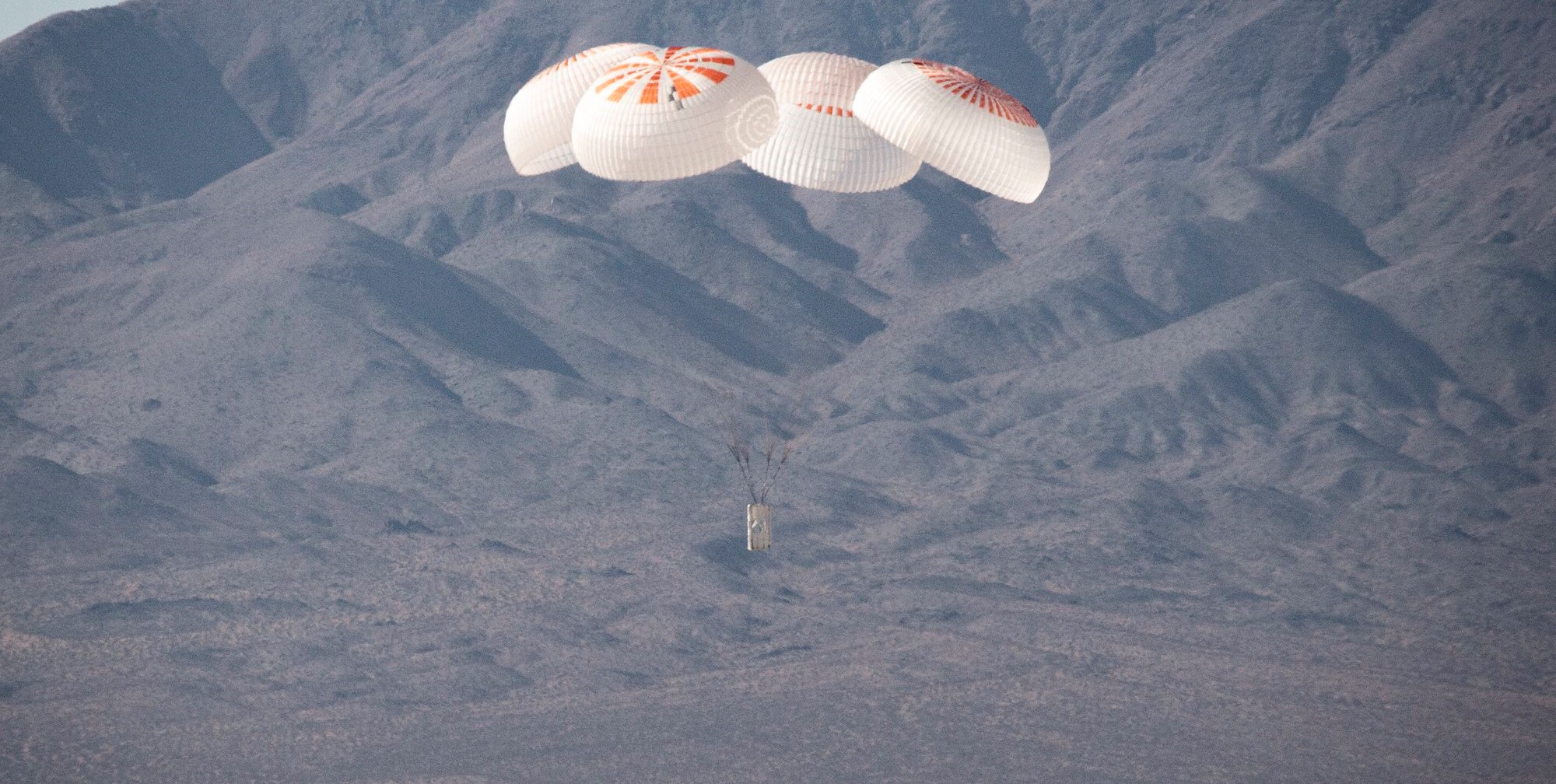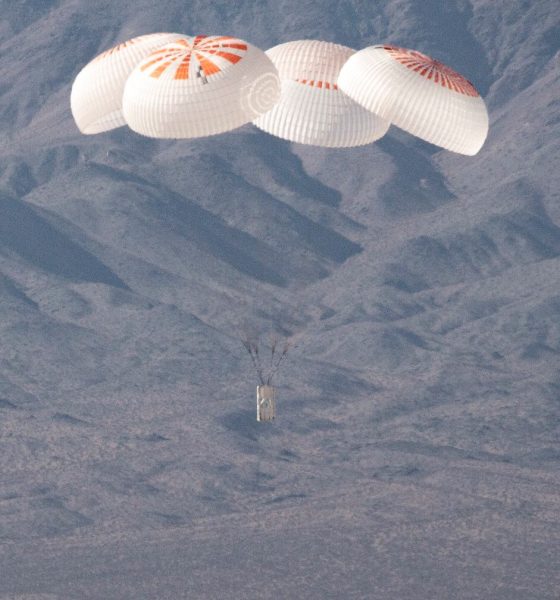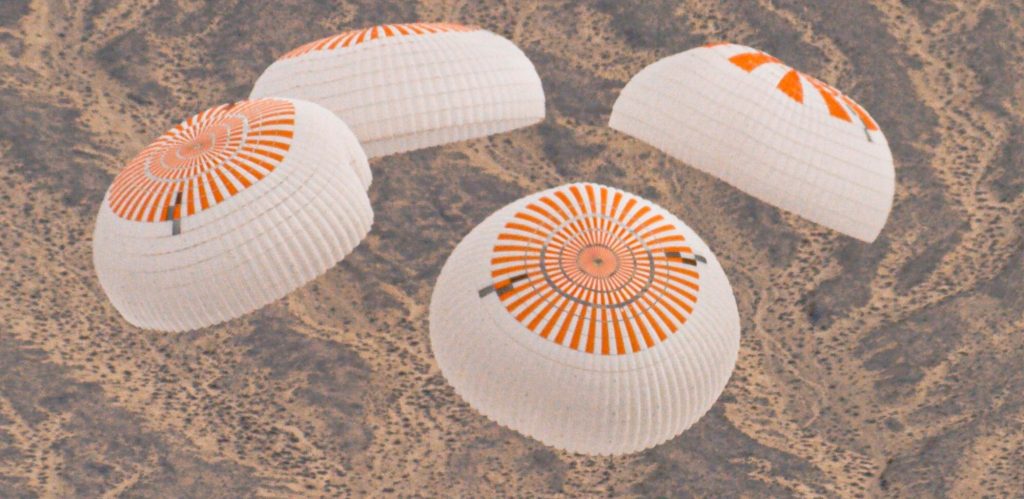

News
SpaceX’s Crew Dragon parachutes are almost ready for NASA astronauts
SpaceX says Crew Dragon’s upgraded “Mk3” parachutes are almost ready to safely return astronauts to Earth and need to pass just a few more consecutive tests before NASA will have the data it needs to qualify them.
Although SpaceX originally hoped to pursue a program of propulsive landing for Crew Dragon and Cargo Dragon space capsules, that effort was canceled to avoid the major cost increases and delays NASA’s qualification certification requirements would have triggered. Already designed with parachutes as a backup, SpaceX quickly pivoted and redesigned those parachutes as the primary (if not sole) method of gently landing astronauts back on Earth.
That decision was likely made in late 2016 or early 2017 and CEO Elon Musk announced the program’s cancellation – as well as plans for “Red Dragon” Mars landings – in July 2017. For the next 18 months, SpaceX worked with suppliers and NASA to design and test a parachute system up to the space agency’s extremely rigid standards. Coincidentally, Cargo Dragon suffered a significant (but survivable) parachute failure the same year when one of its three main chutes failed to deploy before splashdown. Additionally, Crew Dragon’s first “Mk1” parachutes suffered their own failures during testing.
A Mk2 variant was designed and built to account for Mk1’s issues, but it too suffered failures during field tests, particularly struggling to make it through tests simulating the failure of one Dragon’s main parachutes. As a result, NASA further required SpaceX to add a fourth parachute, requiring a whole new round of tests and experimentation due to the significantly different dynamics it introduced. Mk2 testing continued into 2019 but SpaceX quickly switched gears and worked with its supplier to design an even more upgraded “Mk3” parachute, building off of a cutting-edge program to model parachute deployment more accurately than ever before.
Over the course of 2019, SpaceX began to extensively test Mk3 parachutes with a variety of drop tests. Unfortunately, even Mk3 suffered a failure or two at first, leading SpaceX and its supplier to refine the design even further.
“[In October and November,] SpaceX says it successfully completed thirteen consecutive tests of Crew Dragon’s new Mk3 parachutes in less than two weeks. That essentially blew [NASA administrator Jim] Bridenstine’s expectations out of the water, as SpaceX surpassed his predicted 10 tests and did so barely three weeks into the tentative 12-week window he set. SpaceX now has plenty of time to either continue testing Crew Dragon’s parachutes or refocus its efforts on other equally important qualification challenges.
Prior to those thirteen consecutive successes, SpaceX suffered two failures during single-parachute Mk3 testing. The first two development tests of the Mk 3 design used loads much higher than the parachutes would ever see in operation in an effort to better understand overall design margins and system performance. After a period of rapid iteration with parachute provider Airborne Systems, the faults responsible for those two stress-test failures were resolved and subsequent drop tests confirmed that Mk3’s suspension lines – the numerous lines connecting the parachute to Crew Dragon – are far stronger than those on Mk2.”
Teslarati — November 3rd, 2019
In the latest chapter of the Crew Dragon parachute saga, on December 4th, SpaceX tweeted that the spacecraft’s upgraded Mk3 chutes recently completed their seventh successful “system test”. On November 3rd, CEO Elon Musk tweeted that one such multi-chute test had already been completed but said SpaceX wanted to successfully complete ten such consecutive tests before it would feel fully confident in the upgraded parachutes.

If the seven tests SpaceX is now describing are part of the same planned series that kicked off in early November, then those seven were likely consecutive successes and leave just three more tests (give or take) to go. Additional testing may well be required by SpaceX, NASA, or both parties, but if Mk3 continues to perform as well as it has over the last two months, Crew Dragon’s recovery systems ought to be well on their way to NASA certification. Once NASA gives the go-ahead on Crew Dragon’s parachutes (and every other facet of the spacecraft), SpaceX can proceed with its Demo-2 mission, set to be SpaceX’s inaugural astronaut launch and likely to mark the first time the US has launched its own astronauts in nearly nine years.
Check out Teslarati’s Marketplace! We offer Tesla accessories, including for the Tesla Cybertruck and Tesla Model 3.

News
Tesla ships out update that brings massive change to two big features
“This change only updates the name of certain features and text in your vehicle,” the company wrote in Release Notes for the update, “and does not change the way your features behave.”

Tesla has shipped out an update for its vehicles that was caused specifically by a California lawsuit that threatened the company’s ability to sell cars because of how it named its driver assistance suite.
Tesla shipped out Software Update 2026.2.9 starting last week; we received it already, and it only brings a few minor changes, mostly related to how things are referenced.
“This change only updates the name of certain features and text in your vehicle,” the company wrote in Release Notes for the update, “and does not change the way your features behave.”
The following changes came to Tesla vehicles in the update:
- Navigate on Autopilot has now been renamed to Navigate on Autosteer
- FSD Computer has been renamed to AI Computer
Tesla faced a 30-day sales suspension in California after the state’s Department of Motor Vehicles stated the company had to come into compliance regarding the marketing of its automated driving features.
The agency confirmed on February 18 that it had taken a “corrective action” to resolve the issue. That corrective action was renaming certain parts of its ADAS.
Tesla discontinued its standalone Autopilot offering in January and ramped up the marketing of Full Self-Driving Supervised. Tesla had said on X that the issue with naming “was a ‘consumer protection’ order about the use of the term ‘Autopilot’ in a case where not one single customer came forward to say there’s a problem.”
This was a “consumer protection” order about the use of the term “Autopilot” in a case where not one single customer came forward to say there’s a problem.
Sales in California will continue uninterrupted.
— Tesla North America (@tesla_na) December 17, 2025
It is now compliant with the wishes of the California DMV, and we’re all dealing with it now.
This was the first primary dispute over the terminology of Full Self-Driving, but it has undergone some scrutiny at the federal level, as some government officials have claimed the suite has “deceptive” names. Previous Transportation Secretary Pete Buttigieg was one of those federal-level employees who had an issue with the names “Autopilot” and “Full Self-Driving.”
Tesla sued the California DMV over the ruling last week.
News
Tesla workers push back against Giga Berlin unionization
“IG Metall did not succeed in Giga Berlin‘s works council election earlier today. The union share was reduced from nearly 40% in 2024 to 31% in 2026! This is a clear message by the Giga Berlin team towards an independent co-determination! The list called Giga United, led by the current chairwoman, Michaela Schmitz, received the most votes with more than 40%! Good news for Giga Berlin!”

Tesla workers pushed back against unionization efforts at Gigafactory Berlin, and over the past few years, there has been a dramatic decrease in interest to unionize at the German plant.
Gigafactory Berlin Plant Manager André Thierig announced on Wednesday that IG Metall, the European union group, saw its share reduce from 40 to 31 percent in 2026 as employees eligible to vote on the issue. Instead, the Giga Berlin team, known as Giga United, received the most votes with more than 40 percent.
BREAKING! 🚨
IG Metall did not succeed in Giga Berlin‘s works council election earlier today. The union share was reduced from nearly 40% in 2024 to 31% in 2026!
This is a clear message by theGiga Berlin team towards an independent co-determination!
The list called Giga…
— André Thierig (@AndrThie) March 4, 2026
Thierig gave specific details in a post on X:
“IG Metall did not succeed in Giga Berlin‘s works council election earlier today. The union share was reduced from nearly 40% in 2024 to 31% in 2026! This is a clear message by the Giga Berlin team towards an independent co-determination! The list called Giga United, led by the current chairwoman, Michaela Schmitz, received the most votes with more than 40%! Good news for Giga Berlin!”
There were over 10,700 total employees who were eligible to vote, with 87 percent of them turning out to cast what they wanted. There were three key outcomes: Giga United, IG Metall, and other notable groups, with the most popular being the Polish Initiative.
The 37-seat council remains dominated by non-unionized representatives, preserving Giga Berlin as Germany’s only major auto plant without a collective bargaining agreement.
Thierig and Tesla framed the outcome as employee support for an “independent, flexible, and unbureaucratic” future, enabling acceleration on projects like potential expansions or new models. IG Metall expressed disappointment, accusing management of intimidation tactics and an “unfair” campaign.
The first election of this nature happened back in 2022. In 2024, IG Metall emerged as the largest single faction with 39.4 percent, but non-union lists coalesced for a majority.
But this year was different. There was some extra tension at Giga Berlin this year, as just two weeks ago, an IG Metall rep was accused by Tesla of secretly recording a council meeting. The group countersued for defamation.
Tesla Giga Berlin plant manager faces defamation probe after IG Metall union complaint
This result from the 2026 vote reinforced Tesla’s model of direct employee-management alignment over traditional German union structures, amid ongoing debates about working conditions. IG Metall views it as a setback but continues advocacy. Tesla sees it as validation of its approach in a competitive EV market.
This outcome may influence future labor dynamics at Giga Berlin, including any revival of expansion plans or product lines, which Musk has talked about recently.
News
SpaceX President Gwynne Shotwell details xAI power pledge at White House event
The commitment was announced during an event with United States President Donald Trump.

SpaceX President Gwynne Shotwell stated that xAI will develop 1.2 gigawatts of power at its Memphis-area AI supercomputer site as part of the White House’s new “Ratepayer Protection Pledge.”
The commitment was announced during an event with United States President Donald Trump.
During the White House event, Shotwell stated that xAI’s AI data center near Memphis would include a major energy installation designed to support the facility’s power needs.
“As you know, xAI builds huge supercomputers and data centers and we build them fast. Currently, we’re building one on the Tennessee-Mississippi state line. As part of today’s commitment, we will take extensive additional steps to continue to reduce the costs of electricity for our neighbors…
“xAI will therefore commit to develop 1.2 GW of power as our supercomputer’s primary power source. That will be for every additional data center as well. We will expand what is already the largest global Megapack power installation in the world,” Shotwell said.
She added that the system would provide significant backup power capacity.
“The installation will provide enough backup power to power the city of Memphis, and more than sufficient energy to power the town of Southaven, Mississippi where the data center resides. We will build new substations and invest in electrical infrastructure to provide stability to the area’s grid.”
Shotwell also noted that xAI will be supporting the area’s water supply as well.
“We haven’t talked about it yet, but this is actually quite important. We will build state-of-the-art water recycling plants that will protect approximately 4.7 billion gallons of water from the Memphis aquifer each year. And we will employ thousands of American workers from around the city of Memphis on both sides of the TN-MS border,” she noted.
The Ratepayer Protection Pledge was introduced as part of the federal government’s effort to address concerns about rising electricity costs tied to large AI data centers, as noted in an Insider report. Under the agreement, companies developing major AI infrastructure projects committed to covering their own power generation needs and avoiding additional costs for local ratepayers.








